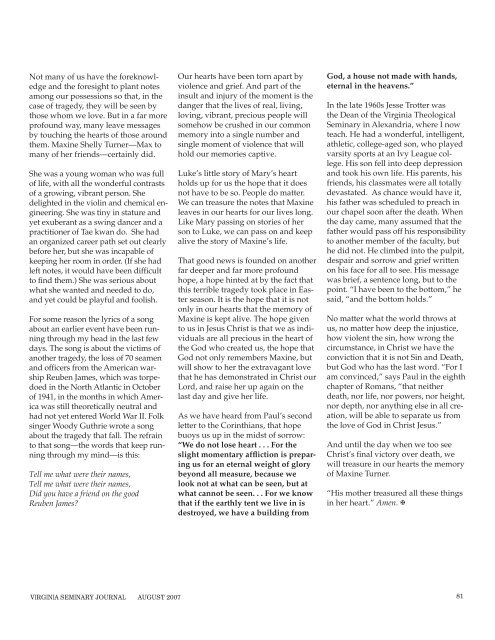Seminary Journal 2008 (August) - Virginia Theological Seminary
Seminary Journal 2008 (August) - Virginia Theological Seminary
Seminary Journal 2008 (August) - Virginia Theological Seminary
You also want an ePaper? Increase the reach of your titles
YUMPU automatically turns print PDFs into web optimized ePapers that Google loves.
Not many of us have the foreknowledge<br />
and the foresight to plant notes<br />
among our possessions so that, in the<br />
case of tragedy, they will be seen by<br />
those whom we love. But in a far more<br />
profound way, many leave messages<br />
by touching the hearts of those around<br />
them. Maxine Shelly Turner—Max to<br />
many of her friends—certainly did.<br />
She was a young woman who was full<br />
of life, with all the wonderful contrasts<br />
of a growing, vibrant person. She<br />
delighted in the violin and chemical engineering.<br />
She was tiny in stature and<br />
yet exuberant as a swing dancer and a<br />
practitioner of Tae kwan do. She had<br />
an organized career path set out clearly<br />
before her, but she was incapable of<br />
keeping her room in order. (If she had<br />
left notes, it would have been diffi cult<br />
to fi nd them.) She was serious about<br />
what she wanted and needed to do,<br />
and yet could be playful and foolish.<br />
For some reason the lyrics of a song<br />
about an earlier event have been running<br />
through my head in the last few<br />
days. The song is about the victims of<br />
another tragedy, the loss of 70 seamen<br />
and offi cers from the American warship<br />
Reuben James, which was torpedoed<br />
in the North Atlantic in October<br />
of 1941, in the months in which America<br />
was still theoretically neutral and<br />
had not yet entered World War II. Folk<br />
singer Woody Guthrie wrote a song<br />
about the tragedy that fall. The refrain<br />
to that song—the words that keep running<br />
through my mind—is this:<br />
Tell me what were their names,<br />
Tell me what were their names,<br />
Did you have a friend on the good<br />
Reuben James?<br />
VIRGINIA SEMINARY JOURNAL AUGUST 2007<br />
Our hearts have been torn apart by<br />
violence and grief. And part of the<br />
insult and injury of the moment is the<br />
danger that the lives of real, living,<br />
loving, vibrant, precious people will<br />
somehow be crushed in our common<br />
memory into a single number and<br />
single moment of violence that will<br />
hold our memories captive.<br />
Luke’s little story of Mary’s heart<br />
holds up for us the hope that it does<br />
not have to be so. People do matter.<br />
We can treasure the notes that Maxine<br />
leaves in our hearts for our lives long.<br />
Like Mary passing on stories of her<br />
son to Luke, we can pass on and keep<br />
alive the story of Maxine’s life.<br />
That good news is founded on another<br />
far deeper and far more profound<br />
hope, a hope hinted at by the fact that<br />
this terrible tragedy took place in Easter<br />
season. It is the hope that it is not<br />
only in our hearts that the memory of<br />
Maxine is kept alive. The hope given<br />
to us in Jesus Christ is that we as individuals<br />
are all precious in the heart of<br />
the God who created us, the hope that<br />
God not only remembers Maxine, but<br />
will show to her the extravagant love<br />
that he has demonstrated in Christ our<br />
Lord, and raise her up again on the<br />
last day and give her life.<br />
As we have heard from Paul’s second<br />
letter to the Corinthians, that hope<br />
buoys us up in the midst of sorrow:<br />
“We do not lose heart . . . For the<br />
slight momentary affl iction is preparing<br />
us for an eternal weight of glory<br />
beyond all measure, because we<br />
look not at what can be seen, but at<br />
what cannot be seen. . . For we know<br />
that if the earthly tent we live in is<br />
destroyed, we have a building from<br />
God, a house not made with hands,<br />
eternal in the heavens.”<br />
In the late 1960s Jesse Trotter was<br />
the Dean of the <strong>Virginia</strong> <strong>Theological</strong><br />
<strong>Seminary</strong> in Alexandria, where I now<br />
teach. He had a wonderful, intelligent,<br />
athletic, college-aged son, who played<br />
varsity sports at an Ivy League college.<br />
His son fell into deep depression<br />
and took his own life. His parents, his<br />
friends, his classmates were all totally<br />
devastated. As chance would have it,<br />
his father was scheduled to preach in<br />
our chapel soon after the death. When<br />
the day came, many assumed that the<br />
father would pass off his responsibility<br />
to another member of the faculty, but<br />
he did not. He climbed into the pulpit,<br />
despair and sorrow and grief written<br />
on his face for all to see. His message<br />
was brief, a sentence long, but to the<br />
point. “I have been to the bottom,” he<br />
said, “and the bottom holds.”<br />
No matter what the world throws at<br />
us, no matter how deep the injustice,<br />
how violent the sin, how wrong the<br />
circumstance, in Christ we have the<br />
conviction that it is not Sin and Death,<br />
but God who has the last word. “For I<br />
am convinced,” says Paul in the eighth<br />
chapter of Romans, “that neither<br />
death, nor life, nor powers, nor height,<br />
nor depth, nor anything else in all creation,<br />
will be able to separate us from<br />
the love of God in Christ Jesus.”<br />
And until the day when we too see<br />
Christ’s fi nal victory over death, we<br />
will treasure in our hearts the memory<br />
of Maxine Turner.<br />
“His mother treasured all these things<br />
in her heart.” Amen. <br />
81



